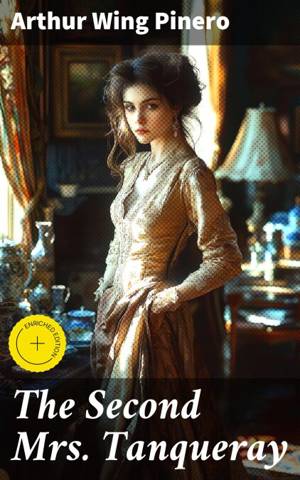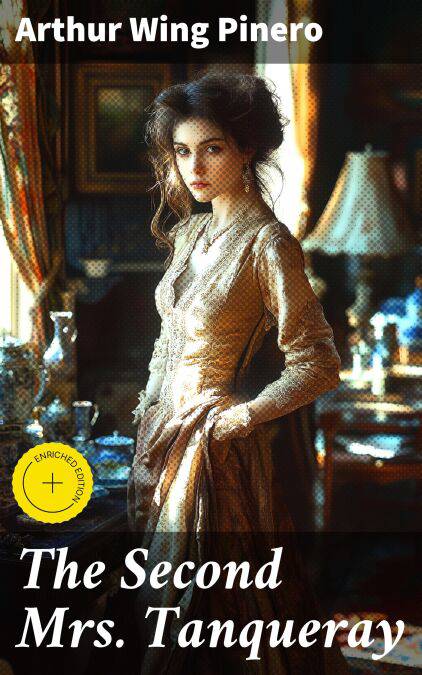
Je cadeautjes zeker op tijd in huis hebben voor de feestdagen? Kom langs in onze winkels en vind het perfecte geschenk!
- Afhalen na 1 uur in een winkel met voorraad
- Gratis thuislevering in België vanaf € 30
- Ruim aanbod met 7 miljoen producten
Je cadeautjes zeker op tijd in huis hebben voor de feestdagen? Kom langs in onze winkels en vind het perfecte geschenk!
- Afhalen na 1 uur in een winkel met voorraad
- Gratis thuislevering in België vanaf € 30
- Ruim aanbod met 7 miljoen producten
Zoeken
The Second Mrs. Tanqueray E-BOOK
Enriched edition. A Play in Four Acts
Arthur Wing Pinero
E-book | Engels
€ 1,99
+ 1 punten
Omschrijving
Arthur Wing Pinero's "The Second Mrs. Tanqueray" is a poignant exploration of societal conventions and the complexities of modern relationships in Edwardian England. The play revolves around the character of Paula Tanqueray, a woman of questionable past who seeks redemption and acceptance in a rigidly moral society. Pinero's rich, naturalistic dialogue and intricate character development reflect the prevailing themes of morality, reputation, and the struggles of feminine identity. Highlighting the tensions between personal desires and societal obligations, the work resounds with the earnest inquiries typical of the late Victorian and early Edwardian eras. Pinero, a prominent figure in early 20th-century theatre, was influenced by his own experiences in a society marked by stringent moral codes and the rising question of women's autonomy. His intimate understanding of the theatrical landscape, alongside his background as a sought-after actor and playwright, infuses "The Second Mrs. Tanqueray" with a clarity and emotional depth that sheds light on the complexities of human relationships. The play emerged during a period of significant social change, reflecting the anxieties of a society grappling with evolving gender roles. This compelling drama is highly recommended for readers and theatre enthusiasts seeking a critical lens on early modernity's influence on personal and social identity. Pinero's masterful crafting of both dialogue and character will captivate anyone interested in the interplay of societal expectations and individual aspirations, making it an enduring piece worthy of study and performance.
In this enriched edition, we have carefully created added value for your reading experience:
- A succinct Introduction situates the work's timeless appeal and themes.
- The Synopsis outlines the central plot, highlighting key developments without spoiling critical twists.
- A detailed Historical Context immerses you in the era's events and influences that shaped the writing.
- A thorough Analysis dissects symbols, motifs, and character arcs to unearth underlying meanings.
- Reflection questions prompt you to engage personally with the work's messages, connecting them to modern life.
- Hand‐picked Memorable Quotes shine a spotlight on moments of literary brilliance.
- Interactive footnotes clarify unusual references, historical allusions, and archaic phrases for an effortless, more informed read.
In this enriched edition, we have carefully created added value for your reading experience:
- A succinct Introduction situates the work's timeless appeal and themes.
- The Synopsis outlines the central plot, highlighting key developments without spoiling critical twists.
- A detailed Historical Context immerses you in the era's events and influences that shaped the writing.
- A thorough Analysis dissects symbols, motifs, and character arcs to unearth underlying meanings.
- Reflection questions prompt you to engage personally with the work's messages, connecting them to modern life.
- Hand‐picked Memorable Quotes shine a spotlight on moments of literary brilliance.
- Interactive footnotes clarify unusual references, historical allusions, and archaic phrases for an effortless, more informed read.
Specificaties
Betrokkenen
- Auteur(s):
- Uitgeverij:
Inhoud
- Aantal bladzijden:
- 156
- Taal:
- Engels
Eigenschappen
- Productcode (EAN):
- 4057664622365
- Verschijningsdatum:
- 25/04/2021
- Uitvoering:
- E-book
- Beveiligd met:
- Digital watermarking
- Formaat:
- ePub

Alleen bij Standaard Boekhandel
+ 1 punten op je klantenkaart van Standaard Boekhandel
Beoordelingen
We publiceren alleen reviews die voldoen aan de voorwaarden voor reviews. Bekijk onze voorwaarden voor reviews.









